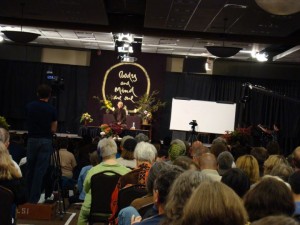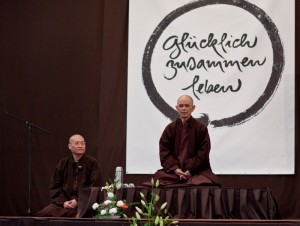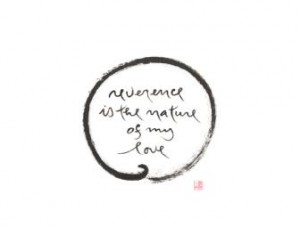
Thay is continuing to write a letter to you from the hermitage Thach Lang in Blue Cliff Monastery. It is October 13th, 2009. Thay just came back from New York. In New York, Thay and the Sangha guided two days of practice for over 2000 American practitioners in the Northeast. It took place in the Beacon Theatre on Broadway Street, and the topic for the two practice days was “Building a Peaceful and Compassionate Society.” At 12:30 p.m. on October 10th, 2009, over 2000 people did walking meditation on Broadway to send energy to Thay’s “Bat Nha Children” who are residing in Phuoc Hue temple.
Thay recalls that during his stay in Phuoc Hue, Thay lived with two monastic brothers – Thay Tam Cat and Thay Duc Tram, who were also around Thay’s age. Back in the 1940’s, the three of us had studied together at the Buddhist Institute Bao Quoc in Hue. Thay Tam Cat’s lay name was Huyen Ton Vien Lau. Thay Duc Tram was one of the elder disciples of the Most Venerable Tri Thu at Paramita Temple. The three of us lived in Phuoc Hue and guided lay friends in their practice. Every early evening, we went out to a large field behind the temple to play soccer. Back then, no one in the monastic circle knew how to play soccer. The Most Venerable Thien Minh (Thay Tri Nghiem) was young back then, about 25 years old and was the first monk to play soccer together with the novices in Linh Son Temple in Da Lat. After a few years, other monks such as Thay Nhu Tram, Tri Khong, Long Nguyet and a number of other monastic students from the Buddhist Institute An Quang also came to Phuoc Hue to study and practice with Thay. At Phuoc Hue Temple, Thay also organized middle school and high school classes for children in the village. Your eldest brother, Nhat Tri, was ordained in this temple. On that same day, another child’s head was shaven and he received three precepts (equivalent to the first, second, and fourth of the Five Mindfulness Trainings). He only received the three precepts because he was too young – only six or seven years old. This little boy later became the Most Venerable Nguyen Hanh, who is now the Abbot of Viet Nam Temple in Houston, which is one of the largest temples in the United States.
Your eldest brother Nhat Tri’s handwriting was exactly like Thay’s; just like your elder sister Luong Nghiem, when she writes calligraphy, her writing also looks a lot like that of Thay. Your brother Nhat Tri was one of the pioneers in the Youth and Social Service movement. He helped build the first two Villages of Love in this movement – Cau Kinh and Thao Dien villages. It was the Most Venerable Chau Duc who brought your elder brother from Quang Nam to entrust him in Thay’s care. The students in those middle school and high school classes of Bao Loc District are now in their sixties and seventies; most have become grandfathers or grandmothers. Smile my children. You are still very young so learn to live deeply in the present moment and smile the fresh and sincere smiles and to look with the eyes that are gentle and bright. Learn to love and forgive right in the present moment and to generate moments of happiness with the practice of mindfulness so that you will not become the aged venerables too soon. Your Grandfather Monk, the patriarch Thanh Quy Chan That, was able to maintain his innocence and pure mind until he was 80 years old that is because he was able to keep his Beginner’s Mind whole. Your Uncle Monk Chi Mau recounted that at Grandfather Monk’s last passing moment, he laid in the lion pose with his two hands joined into a lotus. We too – as teacher and disciples – aspire to practice like Grandfather Monk, maintaining our aspiration and our Beginner’s Mind in tact for our entire life. The energy of the Beginner’s Mind brings us and our loved ones a lot of happiness. The Beginner’s Mind is the most valuable nutriment to a spiritual practitioner.

During this North American tour, when teaching about the Four Nutriments, Thay addressed volition first, as a kind of food, then consciousness, then sense impressions, and then edible foods. This teaching approach was used by Thay first during the tour at the monastic retreat in Deer Park Monastery. Thay hopes that all of you everywhere will have the chance to listen to the three Dharma talks during that monastic retreat. The Beginner’s Mind is also called Bodhicitta or the Mind of Love, which is the essential nutriment for us all. It belongs to the first source of nutriment – volition. Generally in society, people refer to it as the ideal, the aspiration, or the deepest wish of a person’s life. With that ideal of love in mind, instantly we have a great source of energy that helps us progress forward, overcoming all obstacles, realizing our deepest desires and attaining great happiness. A person without an ideal or an aspiration is someone without a life source. For monastic practitioners, that ideal is to transform our own suffering and to help others transform as well. We have come together because of that ideal and not because we seek fame, power or sensual pleasures. Because we know that the desire for fame, power and sensual pleasures can bring a lot of danger and suffering to our body and mind, we are determined to free ourselves from these desires and to find a more wholesome desire – the that desire is our Mind of Love. The Mind of Love is very strong when it first inhabits us. It helps us to break and release all our bondages more easily. During our entire life as practitioners, we should know how to nourish that Mind and to not allow it to erode.
Therefore, we must have a second source of nutriment – consciousness – which is the collective consciousness of the Sangha. The Sangha is a community of people with the same aspiration. Everyone in the Sangha has the energy of the Mind of Love; everyone wants to practice in order to transform ourselves and to contribute to the career of serving humanity. While living harmoniously together in accordance to one of the Six Harmonies, the Sangha is able to generate the collective energy of Mindfulness, Concentration, and Insight. It is this energy that helps nourish the Mind of Love in each member of the Sangha. If you, my disciples love the Sangha, do not want to be separated from the Sangha, and want to find ways to build the Sangha, it is because you have the need to be nourished by this collective energy. Therefore, when they try to disband the Sangha, you have made every effort to protect the Sangha and not to allow the Sangha to be separated.
In society, the revolutionaries also have their Mind of Love. They have their ideal, their aspiration to save their homeland, their people; to push back the invaders and to struggle for their country’s independence. The will of the revolutionaries is not any less impressive than the monastic’s Mind of Love. And these revolutionaries also need a Sangha to nourish their aspiration, and that Sangha is their revolutionary organization. If in the Sangha we have the love of brotherhood and sisterhood, then in the revolutionary organization there is the love of comradeship. This love of comradeship is the source of food, of motivation that can nourish the willpower and endeavor of the revolutionary.
Building a revolutionary organization requires revolutionary ethics: integrity and honesty are the two basic virtues of a revolutionary organization; just like in the monastic precepts where concentration and insight are the true essence of a Sangha. If we do not practice the precepts and mindful manners and nor practice mindfulness, we cannot nourish the Sangha energy. If the revolutionary does not practice integrity and honesty, then he/she cannot nourish the revolutionary organization; and the fire of the revolution will extinguish. This rule holds true for the Sangha as well. Without the practice of living harmoniously together with the energy of mindfulness, concentration and insight, the Sangha will also be lifeless. Outwardly, it looks like a community of practice, but inwardly, it is only composed of individuals who are looking for material and emotional comforts to satisfy a meaningless life.
The Buddhist Church is the Sangha of all the Sanghas. If the Buddhist Church is made of Sanghas with life-force and with ideals born from the Mind of Love, the energy of the Buddhist Church will be powerful and the Buddhist Church will become a source of nourishment for both the monastic and lay practitioners. If not, then the Buddhist Church will only be a place where people come to seek profits and status. If the sacred fire of the revolution has extinguished, then the political establishment no longer has any life-force, and those people who want to join are no longer those filled with the ideal and aspiration to save the country and its people anymore; but are merely people looking for positions and benefits.
When the Catholic priests of the “Dòng Chúa Cứu Thế” spoke up to protect the Bat Nha Sangha, Thay saw that this practice tradition is still able to maintain the life of their community, therefore, they had enough heroic strength to speak up like that. When the Management Board of the Buddhist Church of Lam Dong Province spoke up to offer refuge and to protect the Bat Nha Sangha, Thay saw that the Management Board is still able to maintain the life of their Sangha, therefore they had enough courage and love to do so. If these Venerables spoke up to shelter and protect you, it was because the Bat Nha Sangha is still a Sangha nourished by the Mind of Love; with no one chasing after fame, power and sensual pleasures; with everyone wanting only to practice and to serve.

Last April of this year, at the European Institute of Applied Buddhism in Germany, Thay gave a short Dharma talk about the Sangha and the establishment; that it is important to have the presence of a beautiful Sangha first, the establishment is only secondary. Only when we have a truly beautiful peach, do we go looking for a plate or a tray to put the peach on. Without the peach, then what is the use of the plate or the tray? If we do not have this Bat Nha land, then there will be another Bat Nha else where. What is most important is to build a beautiful Sangha.
The first thing the Buddha did after achieving enlightenment under the Bodhi Tree was to look for his fellow practitioners in order to build a Sangha. Building Sangha is the career of the Buddhas and it is also the career of any spiritual practitioner. This is also the case for members of the revolution, that is, to build a revolutionary party. Without the Sangha, the career of a Buddha cannot be realized. Without the revolutionary organization, the career of revolutionary also cannot be achieved. During the past sixty years, your teacher has never once neglected the practice of building Sangha. Thay has helped build thousands of Sanghas all over the world, and each Sangha has become a place of refuge for many local practitioners. Dr. Martin Luther King was someone Thay felt close to, and he talked about the Sangha as the “beloved communities”, meaning the “beloved Sangha.” The Bat Nha Sangha is also one of these “beloved Sangha.”
When Thay was still a young monk during the revolution against the French, Thay had found ways to protect the revolutionaries when they were in danger and was looking for refuge in the temples. This was one of the most dangerous things to do. The French soldiers could shoot us because we dared to shelter these revolutionaries. Thay Tri Thuyen, Thay Tam Thuong and many other young monastics of Thay’s age were shot because they did these things. Thousands of revolutionaries came to hide in the temples, and the monks and nuns always found ways to shelter and to protect them. Everyone did so because we all loved our country and from this love, we wanted to protect the soldiers. In the letter addressed to the President of Vietnam on September 30th, 2009, Thay reminded him of this story. Thay is confident that when the President was still a revolutionary along with many other soldiers who are now veterans of the revolution, he and they had also undergone many life-threatening moments; and that they shall never forget the tight support back then between the people and the soldiers – the same as water is to the fish.
In that same letter, continuing this same spirit, Thay also wrote that the policemen and those who gave them orders to use all means to evict you from Bat Nha,“certainly, they can not be children of the revolution.” Their actions are ungrateful, immoral, and betraying; and are not ones of the true revolutionary tradition. Thay also requested the President to intervene and stop these actions that go against the principles of the revolution and against the traditional virtues and values of our motherland. Why have these policemen behaved like that, using such violent means? Why can’t they continue the integrity and honesty of the revolution? Why are they not children of the revolution? Why do corruption and power abuse permeate everywhere? There is only one accurate answer: It is because the fire of the revolution has extinguished. The virtues of the revolution no longer exist. The source of inspiration, which is the ideal of the revolution, no longer exists.
When we cannot retain our Mind of Love – our Bodhicitta – then we are no longer each other’s “companions on the path” or “friends of the common path”; even though we may refer to ourselves as Buddhists or as disciples of the Buddha. When the aspirations of revolutionaries no longer exists, when we are eroded by corruption and power abuse, then we are no longer each other’s “comrades,” even though on the social level we may still call each other “comrades”. When we have our aspirations, our Mind of Love, our brotherhood and sisterhood, then we no longer need to search for happiness in the direction of money, fame, power and sensual pleasures anymore. Together, we live a healthy and simple life. Thay has sat in meditation with you, eaten in mindfulness with you, breathed with you, listened to the bell with you, gone on walking meditation with you, worked with you, and organized retreats with you. Thay has found a lot happiness in those moments living together. The revolution fighters were also like that. They lived happily together because they shared a common ideal and they were able to let go of what would bring them bondage and restrictions. They fought together side by side, tolerating the storm and wind together, because they had comradeship and because they were kept warm by the sacred fire of the revolution.

Speaking like that does not mean today we cannot re-ignite the fire of the Mind of Love which may have been extinguished in us. It does not mean that we cannot re-ignite the sacred fire of the revolution that has burned out. When you entered the Sangha, the fire of your Mind of Love was inflamed. So many young monastics, after having read the book “Speaking to the Young Monks and Nuns” and having made contact with the Sangha, were able to rekindle their Mind of Love. Thus, we began to live together genuinely and happily because the fire of aspiration was burning brightly within us. And thus with each passing day, young people came in multitude. This influx created fear in the hearts of some people. These people sent their own to infiltrate into our communities in Plum Village, Deer Park, Tu Hieu, Bat Nha and everywhere; to see what we were really doing, and to investigate why we could attract so many young people so quickly?
Do we have any secret? We do not have any secret! If there is such a secret, then it must be because we know how to live truthfully with each other in the spirit of brotherhood and sisterhood. We know how to let go of pursuits that can bring us attachment and bondage. We have a deep aspiration to practice, to help others and to serve all of life. We live each moment with that aspiration. Therefore, when young people interact with us, their hearts are also ignited by this aspiration. This certainly can be accomplished within a community as well as within a revolutionary organization, if only people lived truthfully with each other, if only they can re-ignite the fire of the revolutionary ideal, if only people had the energy derived from their aspiration; then corruption and power abuse will be defeated. Then, those who join the party are no longer the exploiters and opportunists anymore.
If those who come to examine us could see this truth, then both sides would benefit. We may practice in peace, and they, learn ways to revive the confidence in their ideals. Unfortunately, these people can not see this truth and so they are suspicious and from this suspicion, fear is born. Because of this fear, they used unethical means to dissolve a community of young people whom they had felt they could not control. The truth is – why is it necessary to control the cultivation of virtues?
Once, there lived a king who was curious to find out how a sitar could produce such magical sounds. He gave orders to split the sitar into pieces to find its secret. It was divided into hundreds of parts but he could not find the root of the magical sounds that he had heard. To know its secret, one has to sit quietly and to observe carefully the sitar and the way it is played and not in splitting it open. The Sangha is also like a sitar. To participate in it and observe it carefully and one will see the miracle of the Sangha. Why must one have to split the Sangha up into many pieces by sending each person home? To do so, one loses the opportunity to learn. The veterans of revolution and all of us who has kept a little of the fire of the revolution within our hearts, because of the truth exposed from the Bat Nha crisis, we all have the chance to look deeply in order to rekindle the wonderous flame that had always been in us.
(The letter is still long. Thay will send you more later.)
Live each day beautifully,
Thay


Share Your Reflections